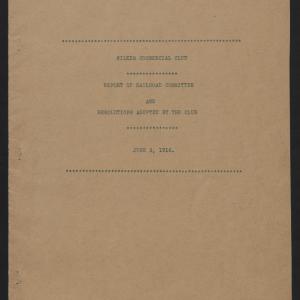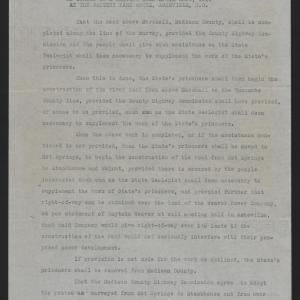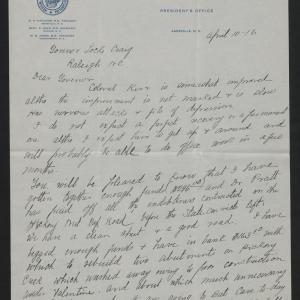- Transcription
The Dispatch
LEXINGTON, N.C.
May fifteenth,
Nineteen-Thirteen.
Personal
Governor Locke Craig,
Raleigh, N.C
Dear Governor:
At a regular meeting of the Board of Trustees of the State's Prison in Raleigh Tuesday we had a number of applications for convicts to work on public roads for cash at $1.50 per day, all of which we had to turn down. We also had a delegation from Watauga county demanding additional convicts to work on the Watauga Railroad. We told them there were not convicts available, but they insisted that there were, and said that your Council of State promised them that they should have fifty or seventy-five at once, and more later on; all, of course, free gratis.
Personally, I am eternally opposed to giving the services of the state convicts to railroads and other private corporations, but if you and the Council of State insist on doing this, and the state is going to pay the penitentiary cash for these bogus certificates that we receive in payment for the services of convicts, and the citizens of the state haven't any more sense than to submit to the wasting of their money in this manner, we will have to continue to take orders. It is a "measley shame."
Everybody knows that the convicts on Col. Jones' road in Haywood county is a rank fraud, that it is absolutely disgraceful and that they were put on that road for political purposes. In other words, Governor Kitchin did this to bribe the citizens of Haywood county to vote for him for United States senator. There is no more prospect of building that railroad than there is of men taking wings and flying, and that ought to be stopped immediately by wire.
It is also a well known fact that the project of the Statesville Air line is a piece of political jobbery put up by Governor Kitchin for the same identical purpose. In my opinion, it is purely a question of speculation by private individuals in Iredell county and the people's money should not be used for such fraudulent purposes.
As to the Watauga Railway, which is promoted by Mr. Grandin, a gentleman from Pennsylvania, he is building a road from North Wilkesboro through sixty-five thousand acres of fine timber land, which he purchased for a little less than a million dollars. This is purely a business proposition on his part. I see no reason why this state should spend its good money and use its convicts to promote this railroad, which is purely a lumber road, being built by a smart Pennsylvania Yankee for speculative purposes. Do you think we should take convicts that are earning the state $1.50 a day cash and give them to be used for the promotion of this scheme?
The only proposition where the state is giving convicts, in my opinion, that has any merit in it is the Elkin and Alleghany Railway. We decided Tuesday to investigate all these camps as early as possible, but we want to do what you want done, and I would like for you to think this matter over and write me, or, if you prefer, I can run down and talk the matter over with you before we make the date to start out to investigate these camps.
Personally, I am very anxious to see the Hickory Nut Gap road have the number of convicts that the Legislature authorized them to have to build that link of the state highway between Asheville and Charlotte. I believe you would be doing a wise thing to take the convicts off of Col. Jones' alleged railroad at once and give them to the Hickory Nut Gap road. I am also very anxious to give Madison county the convicts that the Legislature authorized them to have to work on the Central Highway. Madison county has shown her good faith by voting $300,000 in bonds, and they ought to have every encouragement possible by the state. These two propositions mean development for North Carolina, and they should be encouraged in every way possible. If you haven't had a talk with Superintendent Mann in regard to Col. Jones' fake you should do so at once, as he has been up and investigated and can give you the facts.
I know you are very busy and that you are deeply interested in the question of freight rates, which is of great importance to the state. This question of better roads is of much greater importance, and, as you know, it costs more for transporting a bushel of wheat from a farm nine miles in the country to town over the bad roads than it costs to transport that same bushel of wheat from New York to Liverpool. When I figure on this proposition, I realize that the freight rate proposition is such a small thing in comparison to the bad road tax, that I don't give freight rates much consideration; yet, if you get what you want in the way of just freight rates, you will have done the state one of the greatest services that has ever been done for it by any previous administration.
With highest personal regards, I am,
Very truly yours,
H B Varner
HBV-H.
Date:
Sender:
Recipient:
Related People:
Repository:
Collection:
Places:
»» »» New York
»» North Carolina »» Haywood
»» North Carolina »» Iredell
»» North Carolina »» Madison
»» North Carolina »» Watauga
»» »» Pennsylvania







